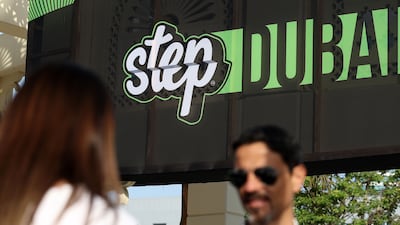The Levant region's start-up ecosystem is transforming, offering opportunities across Lebanon, Syria, Jordan, and Palestine, despite challenges like regulatory hurdles, infrastructure limitations, and access to capital, say industry experts.
Speaking at the Step Conference in Dubai on Thursday, Rasha Manna, Flat6Labs Mashreq's general manager, highlighted the region's long-standing entrepreneurial heritage and strong global connections.
"It's easy to forget that the Levant, and maybe Jordan specifically, is very much the epicentre of entrepreneurship in the region," Ms Manna said.
She also pointed out the role of historical trade networks and the diaspora in fostering innovation.
"We're very much historically a trade hub. The ports of Palestine, Syria, Lebanon, and Jordan always connected Africa, Asia, and Europe," Ms Manna said.
She added that the Levant's "turbulence and turmoil" history has led to an extensive diaspora network.
"They've gone and set up businesses elsewhere, but they've maintained their connections with their homeland, and so the diaspora played a big part in driving entrepreneurship and innovation in the region," she said.
Emerging sectors and growth areas
Other panelists also identified key sectors with high growth potential, particularly in the context of Syria's gradual return to the regional economy.
"One of the things that's both a challenge and an opportunity for the Levant is that three of those countries are very small markets, so we're from the get-go building for bigger markets. We're building for regional or global solutions," Ms Manna said.
Abdulsalam Haykal, chief executive of Majarra, also provided insights into Syria's evolving start-up ecosystem.
After a 13-year absence, he recently returned to Damascus and organised a tech conference, marking a step towards reintegration into the regional economy, he said.
"Syria is back," Mr Haykal told The National. "It won't be an easy ride, but we've moved from the threshold of the impossible to the possible."
Syria's strong STEM talent and its sizeable population make it a viable market for start-ups. However, he said that infrastructure issues, slow internet, and capital constraints due to sanctions remain significant barriers.
Venture capital for Syria
Mr Haykal believes the traditional venture capital model is unsuited for Syria. "VC works on betting on winners – it's a filtration system. But in Syria, what we need is long-term asset development," he said.
Instead of relying on traditional VC structures, he suggested alternative funding mechanisms to bridge the gap between investors and entrepreneurs.
"The money is there, and the opportunities are there," he said. "What we need to do is unlock value by connecting investors with promising businesses in Syria despite regulatory challenges."
The role of diaspora and global networks
The Levant's large diaspora, particularly in Lebanon and Palestine, is crucial in funding and fostering innovation. She said that many founders who have established businesses abroad remain connected to their home countries, reinvesting in local talent and supporting new ventures.
"There are country-specific challenges, but wherever Levantine entrepreneurs go, they leave a big impact," Ms Manna said. "We are resilient, and we find ways to adapt to uncertainty."
More than 8,000 guests and over 200 speakers attended the 13th Step Conference at Dubai internet City. The annual event, which has been held in Dubai, Riyadh, and San Francisco, has helped raise more than $9.2 billion in funding for start-ups since its inception in 2012.
COMPANY%20PROFILE
%3Cp%3E%3Cstrong%3ECompany%3A%20%3C%2Fstrong%3EGrowdash%0D%3Cbr%3E%3Cstrong%3EStarted%3A%20%3C%2Fstrong%3EJuly%202022%0D%3Cbr%3E%3Cstrong%3EFounders%3A%20%3C%2Fstrong%3ESean%20Trevaskis%20and%20Enver%20Sorkun%0D%3Cbr%3E%3Cstrong%3EBased%3A%20%3C%2Fstrong%3EDubai%2C%20UAE%0D%3Cbr%3E%3Cstrong%3EIndustry%3A%20%3C%2Fstrong%3ERestaurant%20technology%0D%3Cbr%3E%3Cstrong%3EFunding%20so%20far%3A%3C%2Fstrong%3E%20%24750%2C000%0D%3Cbr%3E%3Cstrong%3EInvestors%3A%20%3C%2Fstrong%3EFlat6Labs%2C%20Plus%20VC%2C%20Judah%20VC%2C%20TPN%20Investments%20and%20angel%20investors%2C%20including%20former%20Talabat%20chief%20executive%20Abdulhamid%20Alomar%2C%20and%20entrepreneur%20Zeid%20Husban%3C%2Fp%3E%0A
Company info
Company name: Entrupy
Co-founders: Vidyuth Srinivasan, co-founder/chief executive, Ashlesh Sharma, co-founder/chief technology officer, Lakshmi Subramanian, co-founder/chief scientist
Based: New York, New York
Sector/About: Entrupy is a hardware-enabled SaaS company whose mission is to protect businesses, borders and consumers from transactions involving counterfeit goods.
Initial investment/Investors: Entrupy secured a $2.6m Series A funding round in 2017. The round was led by Tokyo-based Digital Garage and Daiwa Securities Group's jointly established venture arm, DG Lab Fund I Investment Limited Partnership, along with Zach Coelius.
Total customers: Entrupy’s customers include hundreds of secondary resellers, marketplaces and other retail organisations around the world. They are also testing with shipping companies as well as customs agencies to stop fake items from reaching the market in the first place.
Brief scores:
Manchester City 3
Aguero 1', 44', 61'
Arsenal 1
Koscielny 11'
Man of the match: Sergio Aguero (Manchester City)
Results
Stage seven
1. Tadej Pogacar (SLO) UAE Team Emirates, in 3:20:24
2. Adam Yates (GBR) Ineos Grenadiers, at 1s
3. Pello Bilbao (ESP) Bahrain-Victorious, at 5s
General Classification
1. Tadej Pogacar (SLO) UAE Team Emirates, in 25:38:16
2. Adam Yates (GBR) Ineos Grenadiers, at 22s
3. Pello Bilbao (ESP) Bahrain-Victorious, at 48s
What is a robo-adviser?
Robo-advisers use an online sign-up process to gauge an investor’s risk tolerance by feeding information such as their age, income, saving goals and investment history into an algorithm, which then assigns them an investment portfolio, ranging from more conservative to higher risk ones.
These portfolios are made up of exchange traded funds (ETFs) with exposure to indices such as US and global equities, fixed-income products like bonds, though exposure to real estate, commodity ETFs or gold is also possible.
Investing in ETFs allows robo-advisers to offer fees far lower than traditional investments, such as actively managed mutual funds bought through a bank or broker. Investors can buy ETFs directly via a brokerage, but with robo-advisers they benefit from investment portfolios matched to their risk tolerance as well as being user friendly.
Many robo-advisers charge what are called wrap fees, meaning there are no additional fees such as subscription or withdrawal fees, success fees or fees for rebalancing.
How%20to%20avoid%20getting%20scammed
%3Cul%3E%0A%3Cli%3ENever%20click%20on%20links%20provided%20via%20app%20or%20SMS%2C%20even%20if%20they%20seem%20to%20come%20from%20authorised%20senders%20at%20first%20glance%3C%2Fli%3E%0A%3Cli%3EAlways%20double-check%20the%20authenticity%20of%20websites%3C%2Fli%3E%0A%3Cli%3EEnable%20Two-Factor%20Authentication%20(2FA)%20for%20all%20your%20working%20and%20personal%20services%3C%2Fli%3E%0A%3Cli%3EOnly%20use%20official%20links%20published%20by%20the%20respective%20entity%3C%2Fli%3E%0A%3Cli%3EDouble-check%20the%20web%20addresses%20to%20reduce%20exposure%20to%20fake%20sites%20created%20with%20domain%20names%20containing%20spelling%20errors%3C%2Fli%3E%0A%3C%2Ful%3E%0A
Specs
Engine: Dual-motor all-wheel-drive electric
Range: Up to 610km
Power: 905hp
Torque: 985Nm
Price: From Dh439,000
Available: Now


